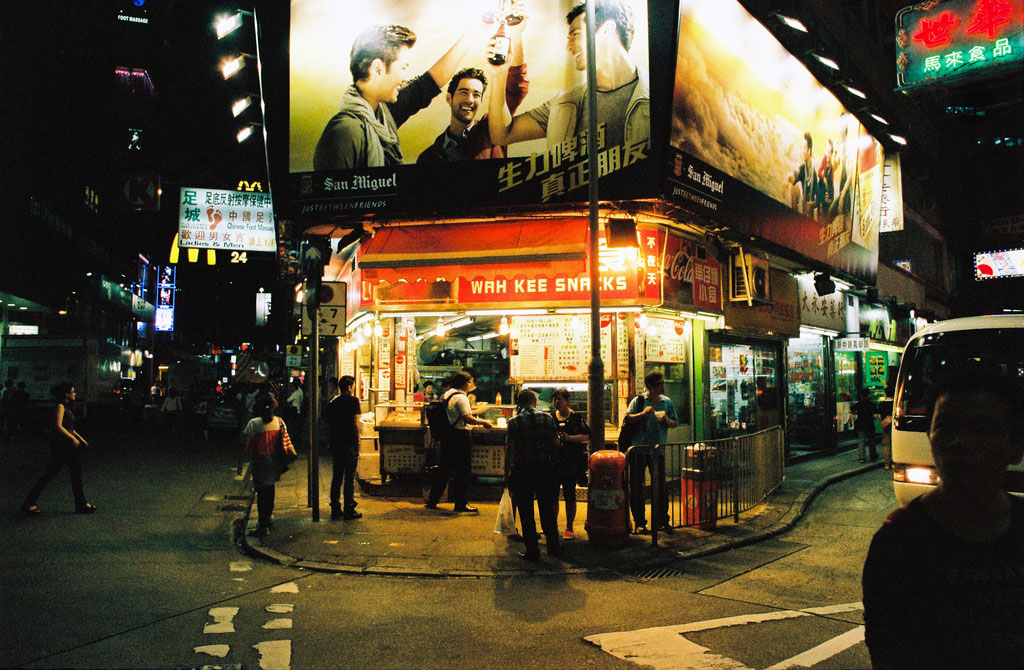
Hong Kong at night. Photo © Nathan O’Nions, licensed Creative Commons Attribution.
Just as Hong Kong’s status as a Special Administrative Region is a hybrid of Chinese and British engineering, the question of identity in Hong Kong is a complex one, and defining who is a Hong Konger and who is a foreigner is a potentially tricky task. Locals are willing to share their culture with you and are also exceptionally patient with the missteps and misunderstandings of foreigners; there is little expectation for you to grasp the intricacies of the Hong Kong workplace (at least not immediately) or start tucking into Bird Nest Soup each lunchtime.In many ways Hong Kong is a tale of two passports. During the uncertain years before the Hong Kong handover, many Chinese Hong Kong citizens obtained British National Overseas passports or took up citizenship in the United States, Canada, Australia, and other Commonwealth nations as an insurance policy, should the communist takeover sink the city. Their fears proved unfounded and many returned, bringing with them their ABC (American Born Chinese), BBC (British Born Chinese), or CBC (Canadian Born Chinese) children. Both children and parents retain strong cultural and familial links with their former home and often consider themselves equally Canadian, American, British, and so on and a Hong Konger. On the opposite side of the equation are the British, Indian, Pakistani, Australian, and various other nationals who were born and bred in Hong Kong, have a right to permanent abode in the city, but retain citizenship of their parents’ countries. Both these immigrants and emigrants are Hong Kongers; both are native and foreign. In a city that has traded on and off its twin Chinese and Western identities, dual nationalities are a product of a city that is proud of its multicultural past and puts little stock in crude, gung-ho nationalism.
Aside from Hong Kong’s homegrown foreigners, there are also a large number of foreign expat residents in the city. Official figures record around five percent of Hong Kong’s seven million citizens as being foreign. The largest minority group is the 115,000 Filipinos and 110,000 Indonesians who mostly work as maids, nannies, or in various other service positions. The number of Western expats has fallen substantially since the 1997 handover, mostly due to tighter work visa restrictions. British nationals, who had free access to the employment market before 1997, were once the largest minority in town but now number just 24,000, followed by 13,000 Americans and 11,000 Canadians. The fact that many Westerners work on short-term contracts means the numbers can be misleading and embassies will tell you the real figures are much, much higher.
The large number of multinationals, international financial firms, and banks based in the city, combined with the fact that English is the primary language of business, makes Hong Kong an attractive proposition for expats. Extensive experience in dealing with foreigners also makes Hong Kong a comparatively easy place to make a new home. Locals are willing to share their culture with you and are also exceptionally patient with the missteps and misunderstandings of foreigners; there is little expectation for you to grasp the intricacies of the Hong Kong workplace (at least not immediately) or start tucking into Bird Nest Soup each lunchtime. There are also fewer of the hassles, frustrations, and government red tape commonly associated with moving and living in another country. Government services, utilities, and service providers are obliged to offer dedicated English-speaking staff and hotlines and are adept at dealing with the special needs of short-term expats.
One grumble is that the city’s Western and Chinese citizens continue to nest in fairly separate, independent communities. This is mostly due to language barriers: Few expats, or even long-term transplants, learn Cantonese and most Chinese lack the ability, or more commonly the confidence, to hold a conversation in English. Familiarity with foreigners also means the inquisitiveness that drives locals in other Asian countries to strike up a conversation is absent. In many ways it is refreshing to be treated just like any other resident, but it can be frustrating trying to find non-work opportunities to mix with the local Chinese Hong Kong population. Many Westerners still favor the rugby pitch, English-style pubs of Wan Chai, and the BBQ’s at the numerous national clubs. Bridging the gap are the ABCs, BBCs, and CBCs, who have a Hong Kong background but a Western upbringing, can speak both languages fluently, and enjoy a pint as much as they do a dragon dance.
Excerpted from the First Edition of Moon Living Abroad in Hong Kong.